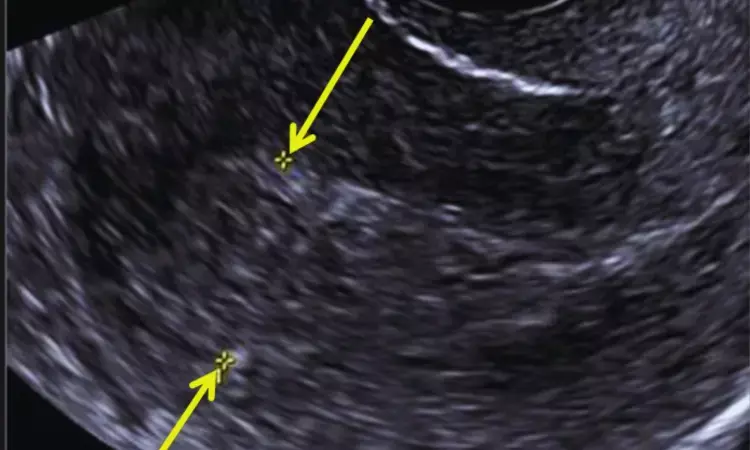- Home
- Medical news & Guidelines
- Anesthesiology
- Cardiology and CTVS
- Critical Care
- Dentistry
- Dermatology
- Diabetes and Endocrinology
- ENT
- Gastroenterology
- Medicine
- Nephrology
- Neurology
- Obstretics-Gynaecology
- Oncology
- Ophthalmology
- Orthopaedics
- Pediatrics-Neonatology
- Psychiatry
- Pulmonology
- Radiology
- Surgery
- Urology
- Laboratory Medicine
- Diet
- Nursing
- Paramedical
- Physiotherapy
- Health news
- Fact Check
- Bone Health Fact Check
- Brain Health Fact Check
- Cancer Related Fact Check
- Child Care Fact Check
- Dental and oral health fact check
- Diabetes and metabolic health fact check
- Diet and Nutrition Fact Check
- Eye and ENT Care Fact Check
- Fitness fact check
- Gut health fact check
- Heart health fact check
- Kidney health fact check
- Medical education fact check
- Men's health fact check
- Respiratory fact check
- Skin and hair care fact check
- Vaccine and Immunization fact check
- Women's health fact check
- AYUSH
- State News
- Andaman and Nicobar Islands
- Andhra Pradesh
- Arunachal Pradesh
- Assam
- Bihar
- Chandigarh
- Chattisgarh
- Dadra and Nagar Haveli
- Daman and Diu
- Delhi
- Goa
- Gujarat
- Haryana
- Himachal Pradesh
- Jammu & Kashmir
- Jharkhand
- Karnataka
- Kerala
- Ladakh
- Lakshadweep
- Madhya Pradesh
- Maharashtra
- Manipur
- Meghalaya
- Mizoram
- Nagaland
- Odisha
- Puducherry
- Punjab
- Rajasthan
- Sikkim
- Tamil Nadu
- Telangana
- Tripura
- Uttar Pradesh
- Uttrakhand
- West Bengal
- Medical Education
- Industry
POCUS Promising for Diagnosing Retained Products of Conception, but Caution Advised in Early Pregnancy: Study

USA: Findings published on January 13 in the American Journal of Emergency Medicine suggest that point-of-care ultrasound (POCUS) is an effective tool for diagnosing retained products of conception in women.
The study led by Dr. Zachary Boivin from Yale University found that POCUS accurately identifies retained tissue in patients undergoing surgical or medical management. The researchers recommend that emergency physicians use POCUS as the first imaging option when diagnosing patients with a history that raises concerns about retained products of conception.
Retained products of conception refer to leftover intrauterine tissue following a recent birth, pregnancy termination, or miscarriage, and occur in 1% to 6% of pregnancies, with higher rates after second-trimester deliveries or pregnancy terminations. Treatment options include dilation and curettage, misoprostol, or continued monitoring.
While ultrasound is the primary method for diagnosing this condition, the study highlights the lack of consistent diagnostic criteria, and research focused on how emergency physicians can use POCUS to identify retained products of conception in emergency settings. To address this gap, Dr. Boivin's team evaluated the effectiveness of POCUS in detecting this condition and reviewed how cases were managed in the emergency department.
For this purpose, the researchers conducted a retrospective cohort study of patients who visited an Emergency Department with over 110,000 annual visits between 2017 and 2023 and underwent pelvic point-of-care ultrasound. They included patients aged 18 or older with no identifiable intrauterine pregnancy on POCUS and excluded males, those older than 55, or patients with inadequate data. Retained products of conception (RPOC) were defined as hyperechoic or heterogeneous products in the endometrium larger than 10 mm on POCUS. The gold standard for diagnosis was radiology ultrasound or obstetrics and gynecology diagnosis for patients without a radiology ultrasound.
The investigation yielded the following findings:
- The study included 703 patients, with 58 excluded, leaving 645 patients for review.
- Radiology ultrasound was performed on 512 patients (79.4%), identifying 42 cases of RPOC.
- Of the 133 patients without a radiology ultrasound, 20 had RPOC confirmed through OBGYN diagnosis, resulting in 62 RPOC cases (9.6% prevalence).
- 70 POCUS examinations identified RPOC, with 17 indeterminant results.
- Among 265 patients with a history concerning RPOC, POCUS showed 79.0% sensitivity and 93.8% specificity compared to the gold standard.
- Including all eight indeterminant results as positive, sensitivity increased to 80.7%, and specificity was 90.4%.
- Of the 62 RPOC patients, 21 (33.9%) were admitted, 26 (41.9%) underwent surgery, 26 (41.9%) received medical management, and 10 (16.1%) were expectantly managed.
The study concluded that POCUS exhibited high specificity but relatively low sensitivity for diagnosing retained products of conception (RPOC) in patients with a history suggestive of RPOC.
"While POCUS can effectively identify RPOC, we advise caution, particularly in early pregnancy, as the appearance of the endometrium on transabdominal POCUS can vary during this period, potentially complicating the diagnosis," the researchers wrote.
Reference:
Boivin, Z., Barber, D., Chimileski, B., Fetherston, T., Li, J. J., Liu, R., & Moore, C. L. (2025). Accuracy of point-of-care ultrasound in diagnosing retained products of conception. The American Journal of Emergency Medicine, 90, 65-70. https://doi.org/10.1016/j.ajem.2025.01.032
Dr Kamal Kant Kohli-MBBS, DTCD- a chest specialist with more than 30 years of practice and a flair for writing clinical articles, Dr Kamal Kant Kohli joined Medical Dialogues as a Chief Editor of Medical News. Besides writing articles, as an editor, he proofreads and verifies all the medical content published on Medical Dialogues including those coming from journals, studies,medical conferences,guidelines etc. Email: drkohli@medicaldialogues.in. Contact no. 011-43720751


